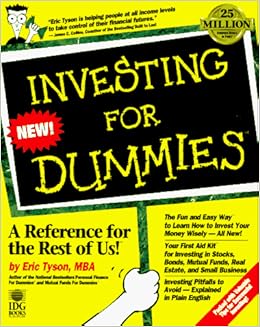
In exchange for the capital. The rest would be in bond funds.

Basic Bond Characteristics.
Stocks and bonds for dummies. As an investor you have a variety of options to choose from including stocks and bonds. The investment you select depends on your financial goals your investment preferences and your tolerance for risk. These options represent traditional investments.
You put your money down and hold on. Although you want to make changes as necessary to. About the Book Author Paul Mladjenovic is a well-known certified financial planner and investing consultant with over 19 years experience writing and teaching about common stocks and related investments.
He owns PM Financial Services. He is the author of the first four editions of Stock Investing For Dummies. Stocks and bonds represent two different ways for an entity to raise money to fund or expand its operations.
Stocks are simply shares of individual companies. When a company issues stock it is selling a piece of itself in exchange for cash. 1 Heres how it works.
Say a company makes it through its start-up phase and becomes successful. Bonds and stocks are two of the most well-known financial instruments. The common knowledge for new investors is to diversify their portfolio whether its be.
There are many adages to help you determine how to allocate stocks and bonds in your portfolio. One says that the percentage of stocks in your portfolio should be equal to 100 minus your age. Stocks have historically outperformed other investments such as bonds or savings accounts.
Over the long term an investment in stocks has historically had an average return of around 10-12. Different Types Of Stocks There are two main types of stocks. Common stock and preferred stock.
Common Stock Common stock is well common. Basic Bond Characteristics. A bond is simply a loan taken out by a company.
Instead of going to a bank the company gets the money from investors who buy its bonds. In exchange for the capital. Investing in the stock market is the most common way for beginners to gain investment experience.
Like the two mentioned above allow you to invest in stocks bonds exchange traded funds. Bonds are long-term lending agreements between a borrower and a lender. For example when a municipality such as a city county town or village needs to build new roads or a hospital it issues bonds to finance the project.
Corporations generally issue bonds to raise money for capital expenditures operations and acquisitions. The selling price. Bonds are a lower-risk way to grow your wealth than the stock market.
Learn how they work and decide if they are a good fit for your financial goals. The stock price doesnt fluctuate the way common stock does however so some gains can be missed on companies with hypergrowth. Preferred shareholders also get no voting rights in company elections.
These stocks are a hybrid of common stock and bonds. Welcome to this 7 step guide to understanding the stock market. Ive created this easy-to-follow Investing for Beginners guide to simplify the learning process for entering the stock market.
By leaving out all the confusing Wall Street jargon and explaining things in simple terms Im hoping youll find this as the perfect solution if. Bond Investing For Dummies Cheat Sheet If you want to invest in bonds you need to know how to read the bond ratings that the big three rating companies use and how to figure whether a taxable or tax-free municipal bond is the better investment. Everything you need to know Updated for 2020.
March 2 2020 800 am. If youre looking for a easy to understand take on how stocks work buying bonds and how to invest. Check out this post.
How to invest in stocks and bonds for beginnersMy favorite investing book. A 30-year-old investing for retirement might have 80 of his or her portfolio in stock funds. The rest would be in bond funds.
Individual stocks are another story. Before we can discuss bonds in depth it is important that we establish a common understanding of what bonds are and how they work. As a starting point a bond is a contractual obligation to make.
This brief tutorial will teach you investing 101 and the terminology you need to understand if youre investing as a beginner and want to plan for retirement.